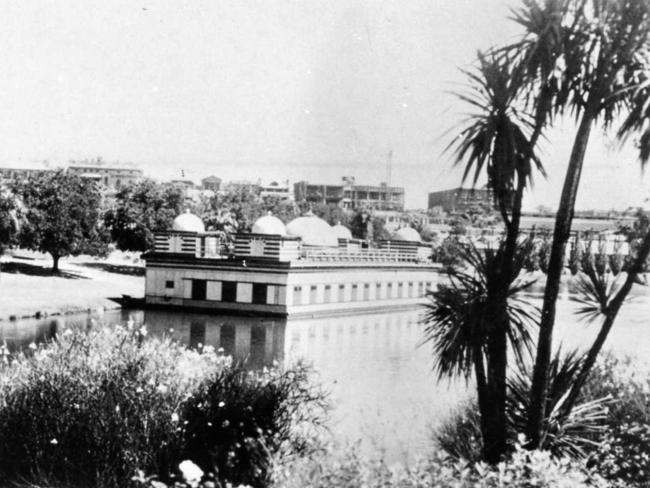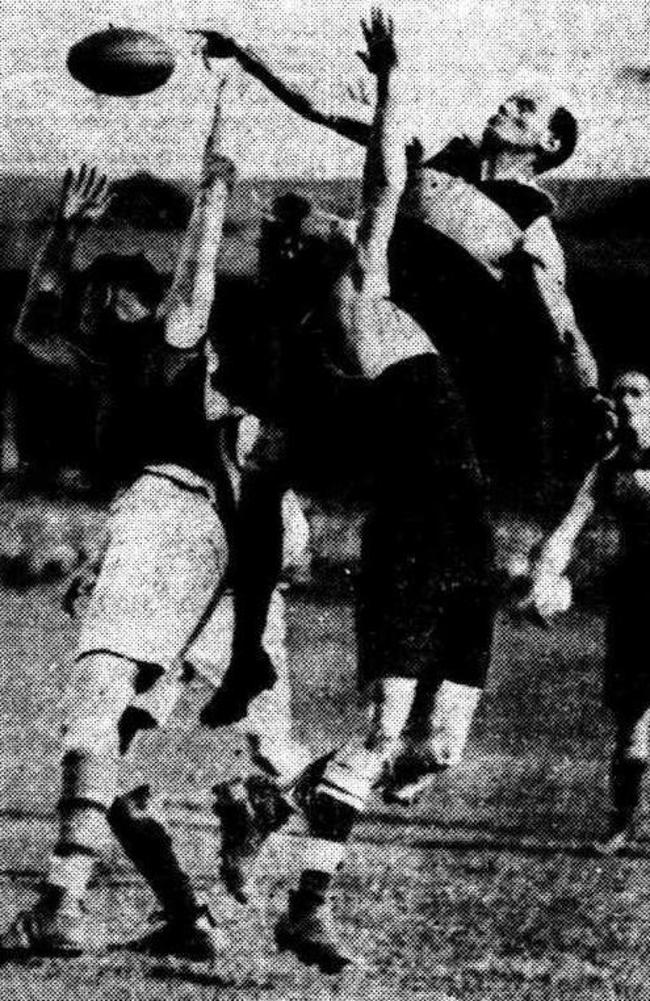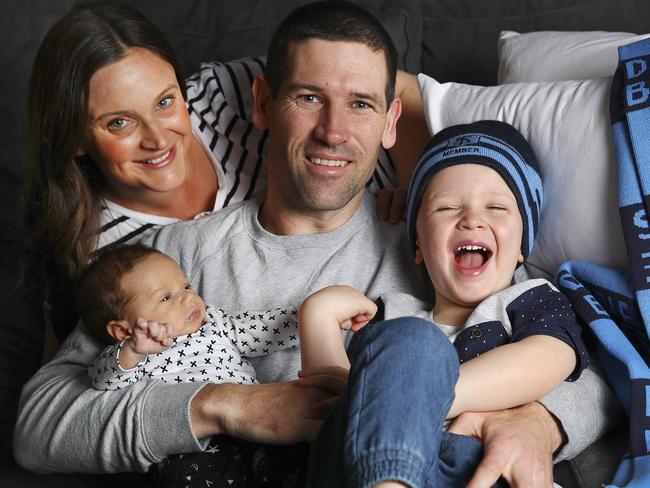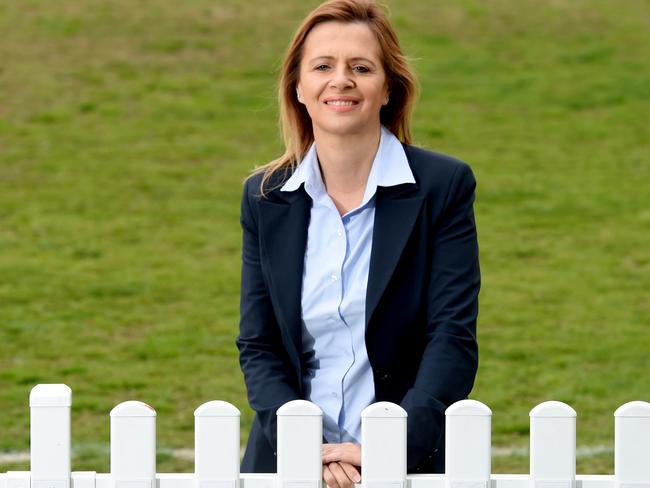Woodville-West Torrens looks back to 1924 SANFL grand final win against Sturt, who they meet again on Sunday
ADELAIDE was surrounded by paddocks, silent films were all the rage, voting in federal elections became compulsory and, after a 27-year wait, West Torrens Football Club finally won their first premiership.
ADELAIDE was surrounded by paddocks, silent films were all the rage, voting in federal elections became compulsory and, after a 27-year wait, West Torrens Football Club finally won their first premiership.
It was September of 1924 when the club — now Woodville-West Torrens — defeated Sturt by just eight points at Adelaide Oval before a record crowd of 44,300 people.
Roy Brown captained West Torrens to victory, with celebrated sportsman and Sturt skipper Victor Richardson visiting the winner’s dressing room post-match, where he jumped on a table and delivered a rousing speech.
Three years later, the league — then the South Australian Football League — made its final name change, becoming the South Australian National Football League.
That game in 1924 — described as a “close and thrilling contest” by The Mail (which later merged with the Sunday Advertiser to become the Sunday Mail) — was the last time the two teams faced off in a grand final, until Sunday.
At the time, the SA population was about 525,000, compared with about 1.7 million today, Rudolph Valentino was the heart throb of silent films and, on a hot day, city slickers could cool off at the Adelaide City Baths, behind Parliament House.

Later that year, a floating dance hall — the Floating Palais — opened on the Torrens, about where the Popeye collects its passengers these days.
The venue was a popular spot for youngsters to dance — remember the Charleston? — before its demolition after an explosion in 1928.
Historian Dr Susan Marsden said despite suburban development, Adelaide city in the ’20s still had close connections with the country.
“You still had paddocks everywhere around Adelaide so many people, even in the inner suburbs, still had access to paddocks and chooks, and cows and so on,” she said.
“So in some ways, it must have been a really delightful metropolitan environment ... because you still had connections with the country as well as the city.”

Dr Marsden said the working week was long and people mostly walked or rode a bike.
“The working week was longer than it became, so people didn’t have a lot of spare time and a lot of the work was still hard ... for example, there was not bulk loading of ships, so people were still literally lugging wheat sacks on their backs,” she said. “And house work was harder, you didn’t have much in the way of labour-saving devices. That was a post-Second World War development.”
While we might romanticise the highlights of the decade now, Dr Marsden said the ’20s was not all flappers and the Jazz Age.
“You had a cohort of pretty traumatised, if not injured, men returning from war service. You also had this horrific ... massive, worldwide flu, what was called the Spanish flu, which actually killed something like 50 million people worldwide ... and then, of course, towards the end of the ’20s the Depression hit.”
Family keeps Sturt coach Marty in the real world
By Roxanne Wilson
JUST like his Double Blues players, the newest addition to Martin Mattner’s family is already highly trained.
The Sturt coach and wife Chelsea, 32, welcomed their second son, Jimmy, into the world just five weeks ago. But if you think a newborn will get in the way of finals footy preparation, think again.
Mattner, whose team will march into battle against the Eagles for the SANFL Grand Final at Adelaide Oval on Sunday, said their newborn wasn’t keeping them up at night. “He is pretty chilled. He’s eating and sleeping and that’s about it,” Mattner said.
“I’m actually sleeping quite well. I’m not waking up thinking about things too much.”
Mrs Mattner, who owns online homewares store White Home Boutique, said their youngest even managed to time his arrival to the benefit of finals footy.

“The best thing Jimmy probably did was he came a little bit early,” she said.
“He was not due until September but he came mid-August, so we had a couple of weeks to sort ourselves out before Marty got really busy.
“(But Marty) is very much a leave-work-at-the-door kind of person, so when he comes home he is always pretty chilled. He has been up with Jimmy most mornings about 6am and letting me sleep in a little bit.”
Mattner said coming home to his family helped put footy into perspective — even the losses. “It actually takes your mind off footy ... looking after Jimmy and Oscar,” he said.
“When you do do footy you are there for footy, and you come home and spend time with the boys.
“Especially after a loss, you come home and you’ve still got to be the same because they don’t really understand.”
Mattner, whose team made a remarkable comeback from eighth last season to be vying for this year’s premiership, said tomorrow’s match was just one more step in a long journey.
“The boys have been really good, they’ve worked hard, and they get the reward of playing in the grand final this weekend ... but we want to be playing finals every year,” he said.
SANFL chief executive Jake Parkinson said tens of thousands of footy fans were expected at Adelaide Oval on Sunday.
Double Blues fly high after near-death experience
By Warren Partland
THE Sturt Football Club walked out of a meeting with the SANFL commission at the end of the 2012 season convinced the doors on the proud club had to be slammed shut.
The Double Blues, wooden spooners for a second successive season, were broke, could not pay the bills and the players were restless not knowing when they would receive their next cheque.
Then Double Blues chief executive Matt Benson and the board had called the gathering in the city to advise the SANFL it had no option but to go into voluntary receivership.
Sue Dewing, a board member back then and now the CEO, recalls leaving the meeting thinking there was no future at Unley.
“It was a really dark time, we were not offered any relief apart from advanced payments,” she said. “We thought we could not continue.

“We’d gone to that meeting thinking the SANFL would not allow a foundation club to go. But we walked out of that meeting thinking this is it, we would have to go to the members to say we were done.
“But a couple of kind benefactors came in the next day or so and they put up the money to keep us trading.”
Incredibly, just four years later, the Double Blues have a chance to claim their 14th premiership when they take on Woodville-West Torrens in the grand final at Adelaide on Sunday.
Dewing claims the club is not flush with funds, but it can pay the bills on time. And the Double Blues are on the verge of posting a third successive operating surplus.
“It was all about rolling up the sleeves and hard work to turn it around,” Dewing said. “We cut costs and overhauled the board and football department.
“I don’t think there is a day when I’m in the office and don’t think about that day we were going to close the doors. And we have been able to pay the players on time, that is one of the biggest achievements.
“To crown it off by being in the grand final, makes it all worthwhile.”
